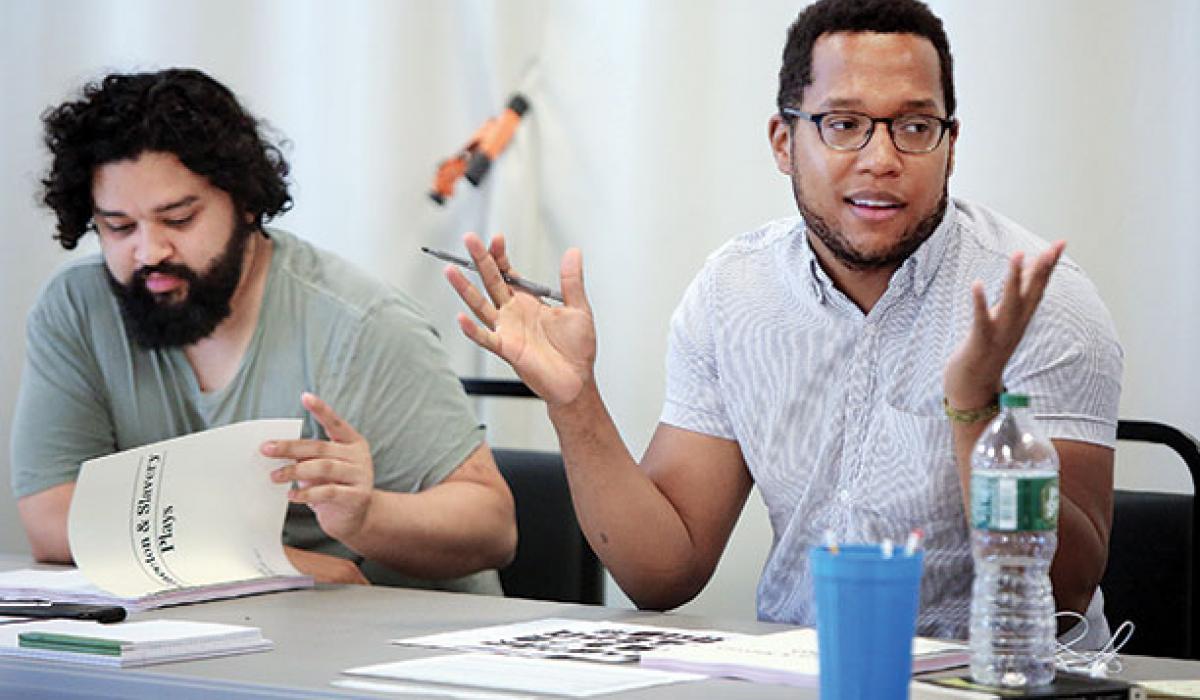On a summer day in 1766, a family stands near two newly planted sycamores at the President’s House, home of the Rev. Samuel Finley, fifth president of the College of New Jersey. The parents — like so many others who will stand in the shade of these trees at what will later be called Maclean House — are focused on helping their child prepare for the road ahead.
But this isn’t the start of a gentleman’s education. This is a family of slaves, and their master, Finley, has just died. This is a family that is about to be ripped apart, denied liberty — a family headed for the auction block.
When Emily Mann, playwright and artistic director at the McCarter Theatre Center, heard about the slave auction on a campus tour led by history professor Martha Sandweiss last year, it was a trigger. “We were going by Maclean ... and my blood turned cold,” she recalls. “I went charging up the stairs. I felt the people there. I stood under the trees.”
Within a week, she says, she had fully imagined this scene, the family, the horror, and a play “came tearing out of me.”

On a summer morning in 2017 in Princeton’s New South studio space, Mann and four other playwrights, nine actors, Princeton scholars, the University archivist, a team from McCarter, and director Carl Cofield gathered for a first reading of that play and six others commissioned by McCarter. The day was an essential step in the process of honing the artists’ voices into a cohesive, provocative program — the Princeton and Slavery Plays — that will be presented as part of the Princeton & Slavery Project Symposium Nov. 17 and 18. Cofield began the day by noting he was excited to work with the playwrights, who each added “their flavor to the rich gumbo” that would help launch “a conversation that’s long overdue.”
As the seminar Sandweiss was teaching on Princeton and slavery evolved into a larger, community project, the professor knew that the performing arts could bring another perspective to the history she and her team of scholars were uncovering as they dug into documents with University archivist Daniel Linke. Artists would not be bound by the rules of her discipline. “There are multiple ways to understand the past and access the emotions and experiences of people who lived a long time ago,” Sandweiss explains. Historians “can’t figure everything out” and “can’t speculate in big, bold ways.” So she turned to Mann to see if McCarter would be interested in a partnership. “Emily has a deep interest in race and American history,” Sandweiss says. “I pitched the idea to her: ‘I’ll tell you the stories, I’ll give you the documents I’ve unearthed.’”
Mann says it took her “about 10 seconds” to say yes, and the seed for the Princeton and Slavery Plays was planted.
THE PRINCETON AND SLAVERY PLAYS
Directed by Carl Cofield
Nov. 18–19, 2017
Berlind Theatre, McCarter Theatre Center
Information about timing and tickets, as well as about pre-show talks and a post-performance discussion, is available at www.mccarter.org/PrincetonandSlavery.
McCarter decided to commission playwrights to create new works in conversation with those archives. The team settled on seven 10-minute plays, making a list of writers whose work seemed well suited to the subject matter. Every person they asked said yes.
The writers — Nathan Alan Davis, Jackie Sibblies Drury, Dipika Guha, Regina Taylor, Kwame Kwei-Armah, Branden Jacobs-Jenkins ’06, and Mann herself — met with Sandweiss and Linke at Mudd Library in the fall of 2016 to examine the primary sources that would inform and inspire their work. They reviewed documents from the American Colonization Society, which proposed to send free black people to Africa; Princeton presidents’ records; land records; student writings; and records of gifts that led to investigations into the sources of the donors’ wealth. Sandweiss then took the writers on a tour of the campus and town, highlighting little-known stories of Princeton’s slave and free black communities.
At the summer readings in New South, emotions ran from grief, anger, fear, and shock to surprise and even amusement. The actors quickly embodied their characters, who ranged from contemporary students to dead presidents, and from those who wielded power to a vulnerable 9-year-old. Cofield called this the beginning of a “scratch-and-sniff” process; later, the playwrights would rewrite, the actors would rehearse, and timing would be adjusted.
Jacobs-Jenkins, whose Gurls, an adaptation of Euripides’ The Bacchae, was commissioned for the opening of the Lewis Center for the Arts complex last month, was drawn to the character of Betsey Stockton, a slave owned by the Rev. Ashbel Green 1783, Princeton’s eighth president, who granted her freedom so she could become a missionary and teacher in Hawaii. Stockton later came back to Princeton and started a school for black children. “There’s a novel in this woman’s life, in the risks she was taking for her gender and her color and age,” says Jacobs-Jenkins. “She had the braveness and fortitude to do so much.”
For Taylor, whose play Crowns premiered at McCarter and will return to the theater in the spring, “the idea of naming yourself” led to an exploration of James Collins Johnson, an escaped slave who “named himself a free man ... and went to a place that was a free state.” Taylor was also drawn to the irony in his story. Johnson was working at the University when he was spotted by someone who knew him and who turned him in; eventually a local woman paid for his freedom in full, and he paid her back. (See PAW, Oct. 5, 2016.)
Names and what they represent are a theme in many of the works. Kwei-Armah, a Briton who changed his name from Ian Roberts after researching his family’s slave history, notes that we live in a culture that calls for transparency. “We’re asking for a more open history,” says the playwright, who is artistic director of Baltimore’s Center Stage. “History is written by the victor, of course,” and “some of [those forgotten] just want their name to be called.”
In his short play, Kwei-Armah created a complex character in African King Peter, who sold land for use by the American Colonization Society. Writing was a challenge, he says: “I didn’t want to celebrate someone who was a slaver, whether black or white. But I also didn’t want to create a lazy character or fall into a stereotype.” He is looking forward to the conversation the plays will stir. “You just need to say, ‘I see you. I hear you.’ Then things will happen that you have no idea of.”
Catherine Mallette ’84 is director of editorial services at HarperCollins Publishers’ Princeton office.


